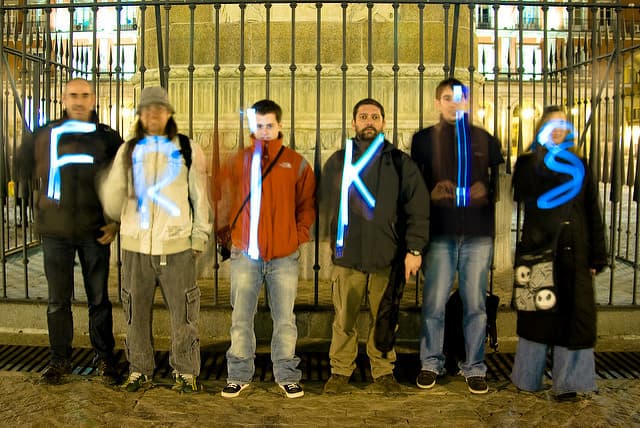Ten 'English' words adopted and adapted into Spanish

The Spanish language is now peppered with words that sound English and often denote a modern sort of concept for which there isn't a Spanish word.
These slang terms have been adapted and adopted to mean something entirely different, so to a native English speaker they sound familiar yet strange at the same time.
Some of the words have become so commonplace in Spanish that you will have a difficult job persuading a Spaniard that they really don't exist in the language of Shakespeare.
The anglicized slang has become so widespread that the Royal Spanish Academy has even launched a campaign to try and put a stop to it.
Here is our list of the top ten terms you are likely to hear in everyday Spanish
Alto standing:

The 'alto standing' rooftop terrace at the Ohla Hotel Barcelona. Photo: Ohlahotel.com
A term used to describe anything luxurious or high-class, from an apartment to a prostitute.
Footing

Photo: Rafa Luque / Flickr
The noun for jogging, and 'hacer footing', as in to 'go jogging'.
Parking

Photo: Israel González / Flickr
Widely used to refer to a car park or parking lot, as in 'I can't find a parking anywhere!'
Zapping

Photo: Dennis Skley/Flickr
The term 'hacer zapping' is commonly used in Spanish to describe channel-hopping or channel-surfing.
Tuning

Photo: Phillip Pessar / Flickr
Used as a noun in Spanish to describe the act of customizing or accessorizing a car. The final product is known as a 'coche tuneado'.
Crack

Cristiano Ronaldo is crack. Photo: AFP
Nothing to do with the drug or a hole of any kind, crack is used in Spanish to describe someone who's great at doing something. So don't feel offended if a Spanish friend calls you a crack, it's actually a compliment.
Gin-tonic

Photo: Richard Patterson / Flickr
Instead of calling it ginebra y tónica, the Spanish have adopted the English name for the refreshing alcoholic beverage and just dropped the 'and' in the middle.
El office

Photo: Paul McCoubrie / Flickr
Somewhat confusing that the Spanish use the noun for a workplace to describe a pantry, breakfast room or utility room.
Friki

Photo: Antonio David Fernández / Flickr
This word is used as a noun rather than adjective, this English-sounding Spanish-spelled word has been used in recent years for anyone odd or with unusual habits or looks.
Smoking

Photo: AFP
If the dress code states Smoking don’t be tempted to actually don a smoking jacket. The term has been adopted in Spain to mean ‘black tie’ and is alternatively spelled 'un esmoquin'.
Can you think of any more examples? Let us know in the comments section below.
List compiled by Alex Dunham
Comments (2)
See Also
These slang terms have been adapted and adopted to mean something entirely different, so to a native English speaker they sound familiar yet strange at the same time.
Some of the words have become so commonplace in Spanish that you will have a difficult job persuading a Spaniard that they really don't exist in the language of Shakespeare.
The anglicized slang has become so widespread that the Royal Spanish Academy has even launched a campaign to try and put a stop to it.
Here is our list of the top ten terms you are likely to hear in everyday Spanish
Alto standing:

The 'alto standing' rooftop terrace at the Ohla Hotel Barcelona. Photo: Ohlahotel.com
A term used to describe anything luxurious or high-class, from an apartment to a prostitute.
Footing

Photo: Rafa Luque / Flickr
The noun for jogging, and 'hacer footing', as in to 'go jogging'.
Parking

Photo: Israel González / Flickr
Widely used to refer to a car park or parking lot, as in 'I can't find a parking anywhere!'
Zapping

Photo: Dennis Skley/Flickr
The term 'hacer zapping' is commonly used in Spanish to describe channel-hopping or channel-surfing.
Tuning

Photo: Phillip Pessar / Flickr
Used as a noun in Spanish to describe the act of customizing or accessorizing a car. The final product is known as a 'coche tuneado'.
Crack

Cristiano Ronaldo is crack. Photo: AFP
Nothing to do with the drug or a hole of any kind, crack is used in Spanish to describe someone who's great at doing something. So don't feel offended if a Spanish friend calls you a crack, it's actually a compliment.
Gin-tonic

Photo: Richard Patterson / Flickr
Instead of calling it ginebra y tónica, the Spanish have adopted the English name for the refreshing alcoholic beverage and just dropped the 'and' in the middle.
El office

Photo: Paul McCoubrie / Flickr
Somewhat confusing that the Spanish use the noun for a workplace to describe a pantry, breakfast room or utility room.
Friki

Photo: Antonio David Fernández / Flickr
This word is used as a noun rather than adjective, this English-sounding Spanish-spelled word has been used in recent years for anyone odd or with unusual habits or looks.
Smoking

Photo: AFP
If the dress code states Smoking don’t be tempted to actually don a smoking jacket. The term has been adopted in Spain to mean ‘black tie’ and is alternatively spelled 'un esmoquin'.
Can you think of any more examples? Let us know in the comments section below.
List compiled by Alex Dunham
Join the conversation in our comments section below. Share your own views and experience and if you have a question or suggestion for our journalists then email us at [email protected].
Please keep comments civil, constructive and on topic – and make sure to read our terms of use before getting involved.
Please log in here to leave a comment.